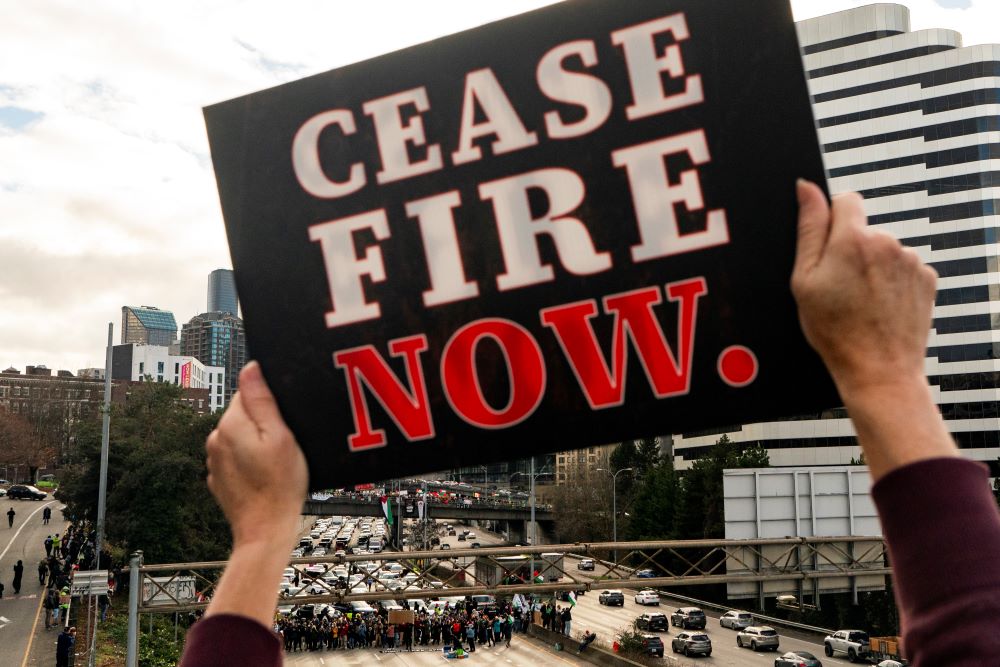
A protester holds a sign calling for a cease-fire to the Israel-Hamas war as others block Interstate 5 northbound on Jan. 6 in downtown Seattle. (AP/Lindsey Wasson)
The utter destruction of Gaza, the indiscriminate killing of civilians — young and old, women and children — in numbers so great that mass graves have become the norm, must end. The killing and destruction is a disproportionate response to the Oct. 7 attack by Hamas; we join the growing chorus, including Pope Francis, of those calling for cessation of the violence.
Any statement taking issue with Israel's tactics in the current conflict opens the door to accusations of antisemitism. That is understandable, particularly given the current highly charged climate, where the complexity of the Israeli-Palestinian relationship is too often and too quickly reduced to a simplistic dualism that does nothing to enlighten. That simplistic approach is quickly subsumed in the rivers of hatreds that define the problem.
If one has genuine regard for Israel and love for Jewish people, then silence in the face of what we are witnessing day to day is not loyalty. Rather, it ignores the central ideal of Israel itself and what it purports to represent to the rest of the world.
We know that any consideration of the Israel/Hamas war cannot take place in isolation from political and military realities. The immediate attack, the slaughter of some 1,200 people in Israel, as well as rapes, dismemberments and scorched bodies, were heinous. The historic situation that toggles between concerns for Israeli security and severe restrictions upon the Palestinian population, has eluded resolution for decades.
We approach this moment with caution and prudence because antisemitism is real and dangerous. But the moment requires that we no longer look away.
We also understand that as Americans, we cannot raise objections without acknowledging that our own response to the Sept. 11 terrorist attacks was followed by two invasions that became known as "endless wars," resulting in unthinkable carnage.
According to the U.S. Institute of Peace, "the statistics are nearly unimaginable: 70,000 Afghan military and police deaths, 46,319 Afghan civilians (although that is likely a significant underestimation) and some 53,000 opposition fighters killed. Almost 67,000 other people were killed in Pakistan in relation to the Afghan war."
The costs in Iraq since the 2003 invasion are worse. The numbers are less precise for Iraqi civilians who died as a result of the invasion and ongoing hostilities, but the estimates begin at more than 280,000 and rise, in at least one estimate, to more than 1 million.
We know the cost in carnage and treasury to unrestrained vengeance. NCR strongly opposed those U.S. military operations for some of the same reasons we now oppose the ongoing and grinding devastation of Gaza.
As Catholics we also know we bear the burden, in raising moral questions about Israel's response to the attack, of silence and in some cases complicity in the unquantifiable horror of the Holocaust. We can only hope that repeated declarations by our leaders that we are all brothers (and sisters) in Abraham is taken seriously. Sometimes siblings are forced to have difficult conversations.
What we don't know — and we fully admit this — is how one deals with attackers intent on your annihilation who lie just on the other side of an invisible border or a makeshift wall. That circumstance to some justifies the "whatever it takes to eliminate" approach now underway. That very circumstance, however, makes an equally if not more compelling case for finding a solution other than the mass destruction of Gaza.
Such ends are impossibilities that only will further fuel hatred and fill the ranks of Hamas loyalists. They also require a willful disregard of certain parts of Israel's history over decades in its relationship with Palestinians.
In a stunning sermon delivered to her congregation before Oct. 7, Rabbi Sharon Brous of Los Angeles spoke this prescient warning about Israel's treatment of Palestinians: "All diagnosticians must take a serious effort to set aside our cognitive biases and see what is truly before us, rather than what our implicit bias orients us toward."
To that end, what she saw was: "56 years of too many people allowing our own trauma and fear to justify the denial of basic rights, dignities, and dreams for millions of Palestinian people living under Israeli rule. Decades of justifying an unjustifiable status quo as the only reasonable response to the failures and missteps of Palestinian leadership and the violence of Palestinian extremists."
That portion of her sermon was part of an often agonizing conversation between Brous and Ezra Klein, New York Times columnist and podcaster and fellow American Jew who decided, in a Nov. 17 podcast, to pull the curtain back and discuss these things that "are hard to talk about."
For his part, Klein identified three categories of Americans and how they think about Israel. Older Americans, he said, view Israel "as the haven for Jews" that once was small and weak but that stood up in warfare to much stronger neighbors.
A following generation, where he places himself, “only ever knew a strong Israel, an Israel that was undoubtedly the strongest country in the region, a nuclear Israel, an Israel backed by America’s unwavering military and political support.” That generation, he said, also knew Israel as “an occupying force” that “did impose its will on Palestinians.” That knowledge was balanced, he said, by knowing “an Israel that had a strong peace movement, where the moral horror of that occupation was widely recognized.” There was a peace process that continued, a hope that persevered despite a series of setbacks.
That view is out of date, he notes, with Americans between ages 18 and 29. A recent Pew survey shows that 56 percent of that age group has an unfavorable view of Israel.
Advertisement

U.S. Secretary of State Antony Blinken, center, is seen Jan. 9 in Tel Aviv, Israel, during a weeklong trip aimed at calming tensions across the Middle East. (OSV News/Reuters/Evelyn Hockstein)
Israel's special standing in the world is under increasing pressure the longer the destruction goes on. Its moral stature, the nation's most precious currency in the international arena, is now often called into question. Concerns about "What’s next?" will have to take into consideration the enormous and persistent show of opposition to the right-wing Netanyahu government before Oct. 7. That opposition, moderated during this period of war, will not disappear.
Already the U.S. has walked back its steadfast support of its closest and most aided ally in the Middle East. Secretary of State Antony Blinken is trying to keep the war from spreading throughout the region, a potential nightmare with unthinkable consequences.
We approach this moment with caution and prudence because antisemitism is real and dangerous. But the moment requires that we no longer look away. Echoing the words of Rabbi Brous, we can no longer ignore "an unjustifiable status quo."




